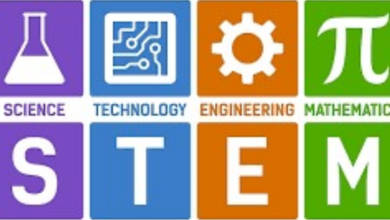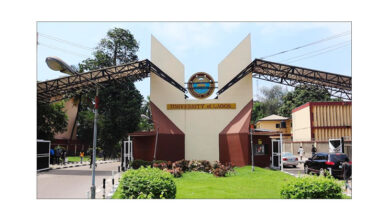Education Stakeholders Canvass Digital Transformation In Universities

During the two-day fourth Annual International Week at the University of Lagos, education stakeholders emphasised the need for a robust student information management system and greater digital transformation, The Courage.
Distinguished educational leaders at the event titled ‘Inclusive Digital Transformation and the University Promise,’ discussed the progress made and future aspirations for digital transformation within their institutions.
The Vice-Chancellor, University of Lagos, Prof. Folasade Ogunsola reflected on the institution’s intentional journey toward digital transformation over the past 57 years.
She spoke on the importance of financial and policy frameworks, noting that significant infrastructure improvements, including high-speed internet capabilities of up to 10 gigabytes per second, had been established across the university’s three campuses.
“Despite these advancements, challenges remain, particularly with Nigeria’s electricity issues impacting equipment and operations.
“The university has implemented a robust Student Information Management System to streamline record-keeping, but ongoing reliance on paper records complicates processes for alumni, especially in light of the increased demand for transcripts driven by the “Japa syndrome,” where many seek education and opportunities abroad,” she said.
The VC mentioned ongoing efforts to digitise administrative processes, making the university more sustainable and inclusive, particularly for students with disabilities.
She said, “Furthermore, the adoption of digital tools has facilitated international partnerships for training and knowledge sharing. Looking ahead, the university aims to continue advancing its digital initiatives while bridging gaps between students’ and lecturers’ technological proficiency.”
Ogunsola concluded that despite resource limitations and the ongoing brain drain, Nigerian universities were making significant strides in their digital transformation efforts.
The First Secretary of the EU Commission in Nigeria, Prof. Leila Mathews, expressed her enthusiasm for the event, stressing the European Union’s strong commitment to higher education.
Speaking on the success of the Erasmus program, she noted its significant role in fostering a shared European culture and youth engagement.
Mathews stressed the EU’s support for Nigerian higher education through scholarships, research grants, and collaborative partnerships, particularly in the digital innovation sector.
Also speaking, Acting Executive Secretary of the National Universities Commission, Dr Chris Maiyaki, addressed the pressing need for digital integration in higher education.
He stressed the transformative power of technology in education, particularly highlighted by the challenges exposed during the COVID-19 pandemic.
Maiyaki noted that the theme of this year’s International Week at the University of Lagos was both timely and pivotal, as the institution led the charge towards the automation and digital delivery of education across Nigeria.
He outlined the NUC’s historical commitment to electronic networking and the establishment of various ICT policies, including guidelines for e-learning and open educational resources.
Maiyaki underscored the NUC’s role as a regulatory body in facilitating digital advancements, enabling foreign investment in Nigerian universities, and ensuring quality standards in education delivery.
Vice-Chancellor, Lagos State University of Science and Technology, Prof. Olumuyiwa Odusanya, mentioned the institution’s commitment to digital transformation as a strategic approach to improving systems and efficiency.
He added that LASUSTECH continued to navigate the complexities of digital transformation while seeking to retain its brightest students and faculty amidst challenging societal conditions.
“Digital transformation goes beyond simply acquiring machines; it fundamentally changes how operations are conducted. For instance, we have streamlined our admissions and communications processes, allowing students to access services using just their laptops, completely free of human interference,” he noted.
He revealed the university’s advancements in high-speed internet access, which supported research and communication.
“We are also expanding the digitalisation of operations, including transcripts and bursary functions, eliminating the need for students to visit banks for payments. The introduction of an ICT initiative focused on computer science, cybersecurity, cloud computing, and artificial intelligence. This initiative will enable seamless operations in teaching and research, ensuring all communications are electronic whether via WhatsApp or email,” he said.
When asked about the challenges faced during this transformation, he pointed to several key issues, including funding and access to data.
“Despite these challenges, there are vast opportunities available, particularly in harnessing the energy of our youth to create local content and innovative applications that address Nigeria’s pressing problems,” he remarked.
Vice-Chancellor, Pan Atlantic University, Prof. Enase Okonedo, explained that the university initially established a local platform for student management and essential services, but the onset of COVID-19 accelerated the need to migrate these systems to the cloud for better access.
“We had to adapt quickly to ensure that not a single day of lectures was lost. The university is focusing on three key areas of technology use; providing access to education, enhancing teaching and learning, and improving internal processes. While the transition presented challenges, including limited bandwidth and accessibility issues, the university successfully implemented online teaching methods without significant disruptions.”
Looking ahead, she expressed hope for increased support for private universities from initiatives like TETFund, which had historically supported public institutions.
Registrar of the Joint Admissions and Matriculation Board, Prof. Ishaq Oloyede, explained the board’s significant role in digitising Nigeria’s education system, saying that JAMB conducted entry examinations for approximately two million candidates, he remarked that such a scale was unmatched globally.
Oloyede explained that JAMB employed advanced ICT solutions for candidate registration and examination processes, enhancing security and accuracy.
He highlighted the board’s Central Admission Processing System, which ensured fair treatment and equity in admissions across 1,240 institutions, including universities, polytechnics, and colleges of education.
“We have automated all systems from registration to admission, ensuring that candidates are treated fairly and without bias. Digital platforms accommodate individuals with disabilities and other challenges, promoting equitable access to education.”
Oloyede commended the University of Lagos for its leadership in promoting digital transformation, stating that the collaboration between JAMB and the university enhanced the overall educational experience for students.
Mr Joseph Odoh, representing the Executive Secretary of the Tertiary Education Trust Fund, commended the University of Lagos for its commitment to digital transformation during a recent event.
He emphasised the importance of focusing funding on enhancing digital inclusion, standardization, and access to teaching, learning, and research. Odoh highlighted Tetfund’s shift from traditional infrastructure provisioning to utilizing ICT as a key enabler in education, especially in light of challenges posed by the COVID-19 pandemic.




